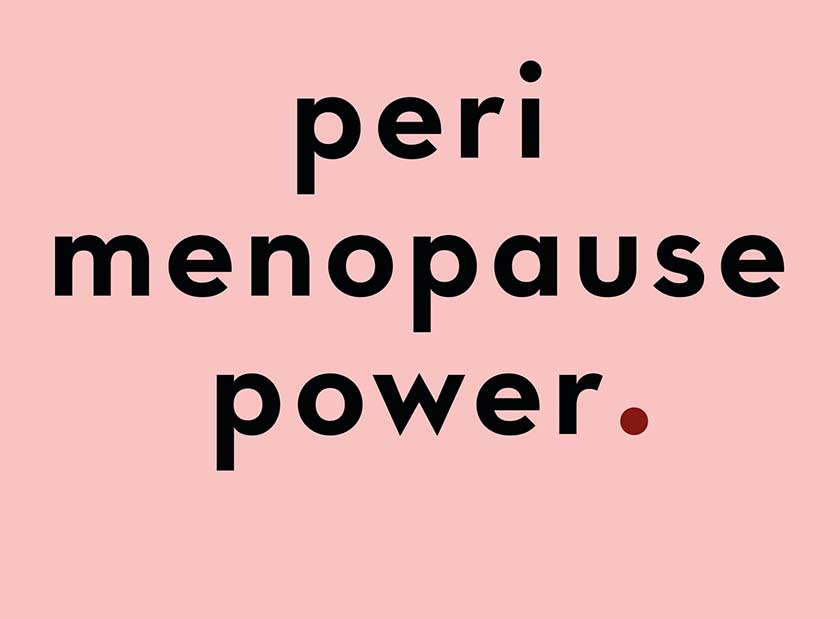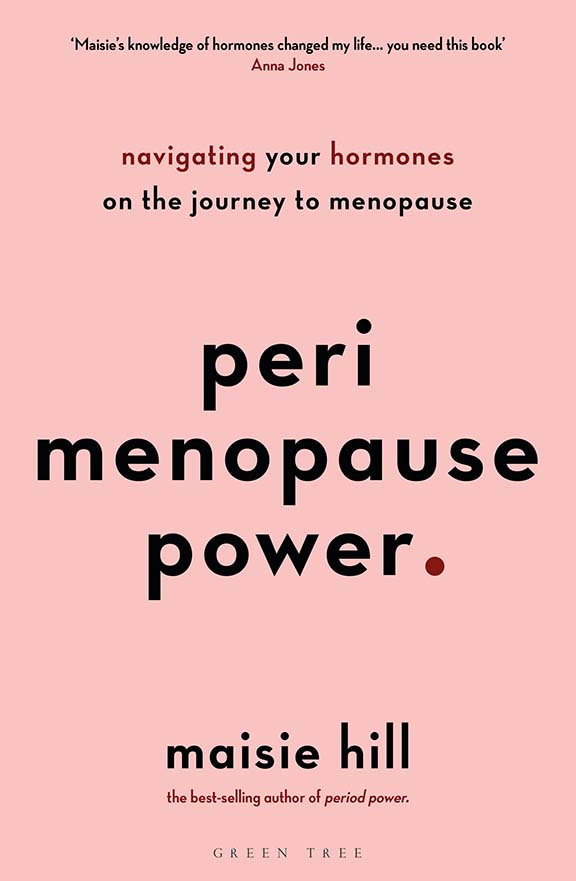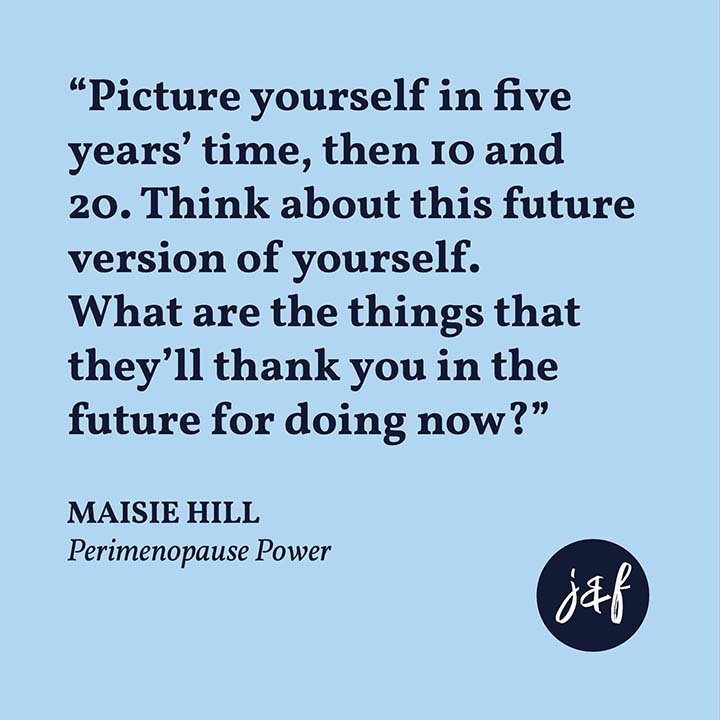
Hormone Rehab: an excerpt of ‘Perimenopause Power’ by Maisie Hill
This is an excerpt of “Hormone rehab” (chapter 10) of Perimenopause Power by Maisie Hill.
Perimenopause will work you like you’ve never been worked before, but it’s possible that this hormonal and psychological transition will give you exactly what you need in order to be equipped for your remaining years. It’s an opportunity for you to let go of everything that no longer serves you; to drop all the heavy stuff you’ve been carting around for years. Perimenopause is the perfect time for you to refine and redefine your life; an opportunity to reclaim joy and pleasure; to come into a deeper relationship with yourself; to unlearn putting others first.

Buy the paperback edition of Perimenopause Power.
Buy the Kindle edition of Perimenopause Power.
The menopause transition is frequently viewed as something that’s gone wrong and therefore needs to be fixed, but what would perimenopause look like if you trusted the process? Perimenopause is when we are faced with ourselves and confronted with the reality of our lives. Then we get to decide what we want to keep and what we want to do away with. Like a snake shedding the skin of our oestrogen years, we can let the people-pleasing niceness of oestrogen drop away. Once that happens, you can pick up whatever interests or serves you. The postmenopausal years can be liberating, not just because of the freedom that comes from not having to worry about pregnancy, but because, as amazing as the menstrual cycle is (you know I’m a fan!), the decisions we make are often steered by what our hormones are up to and the loss of the cycle can come as a relief.

Take a look at everything you’ve made decisions about and committed to over the years — where you live, who you live with, your relationships (romantic, familial, friendship and professional), your working life and any areas of interest — and consider if you want to recommit to them or leave them. By the way, it’s possible to do this without self-judgement or guilt.
When it comes to having a positive experience of perimenopause, as well as setting the foundation for the decades beyond menopause, I recommend that you prepare by focussing on the things that you can control:
- Simplify and streamline your life
- Set boundaries
- Improve sleep
- Address alcohol consumption
- Support oestrogen detoxification
- Avoid endocrine disruptors
- Eat a nutrient-dense diet
- Move and strengthen your body
- Spend more time outside
- Build your support crew.
It’s also time to decide what your non-negotiables are and make adjustments to your schedule so that how you’re living is in line with them. Only you know what’s important to you, but here are some suggestions:
- Sleep and rest
- Health appointments (cervical screening, dental appointments, blood tests, acupuncture, etc.)
- Opportunities to move your body (exercise classes, walking, running, dancing)
- Time alone
- Connecting with others
- Networking
- Time outside
- Food and nourishment
- Intimacy
- Pleasure
- Learning
- Working hours
- Working conditions.
These things aren’t optional, they’re necessary. It’s time to decide what’s more important — picking your kid up and giving them a lift or lifting weights to build bone density to reduce your risk of hip fracture? Sometimes what’s being asked of you will be more important, but I’m willing to bet that this happens way less frequently than you tell yourself it does. You might have some thoughts and feelings about doing less for others. Maybe you tell yourself that in prioritising your needs and desires, you’ll let others down, or that they’ll think certain things about you. That you’re unreliable, unhelpful, incapable, untrustworthy, selfish. I mean, how dare you be selfish by caring for yourself in what’s likely to be very basic ways most of the time?!

Your Future Self
Focussing on your non-negotiables is something that your future self will thank you for. Picture yourself in five years’ time, then 10 and 20. Think about this future version of yourself. What are the things that they’ll thank you in the future for doing now? Going for a run when you weren’t in the mood. Keeping your brain active instead of mindless scrolling on screens. Creating downtime that soothes your nervous system and restores your energy. Saying ‘no’. Laying off caffeine and sugar. Lifting weights. Having the conversations you’ve been avoiding. Making changes. What’s your list like?
Beauty Sleep
Women experience sleep differently to men and it’s the onset of menstruation that stimulates the main differences in sleep between the sexes. As oestrogen and progesterone begin their cyclic ebb and flow, they regulate the sleep-wake cycle and, as you transition through each phase of your life, you’re increasingly likely to experience a sleep disorder. Once we’re in the perimenopause zone, sleep becomes more elusive thanks to changing hormone levels and life stressors. In our perimenopausal and postmenopausal years, 53 percent of us will be having poor-quality sleep, trouble falling asleep, trouble staying asleep, and trouble getting enough sleep. Night sweats, needing to wee and restless leg syndrome all impact on our ability to get a solid night of sleep, as does the radiating heat of someone sleeping next to you and sharing a bed with someone who snores. Then there’s the situation that you’re stewing about and replaying over and over again in your mind in which you’re having imaginary conversations that are stimulating a stress response that’s telling your body to fight or run away, and that’s keeping you awake.
Lack of good-quality sleep causes problems with DNA repair, which accelerates ageing — they don’t call it beauty sleep for nothing. Getting less than seven hours’ sleep is associated with less clearance of the amyloid plaques found in Alzheimer’s disease. Getting less than four hours sleep a night? Come on, I know that’s the case for some of you. Well, we’ve got to sort that out, because less than four hours reduces your natural killer cells — the ones that kill cancerous cells – by 70 percent. Poor sleep and not enough of it doesn’t just leave you feeling like shit, it increases inflammation and stress hormone production, interferes with blood sugar regulation and lowers your immunity. It also raises your risk of metabolic disease, neurological disease and cancer, and makes you less resilient to stress, moody as hell and tired AF.
This is why sleep is critical during peri- and postmenopause. When I treat someone who has sleep issues, no matter what other health issues they’ve got going on, improving their sleep is at the top of my list of treatment aims, because without sufficient good-quality sleep all our other results will be limited. My aims are for clients to:
- Fall asleep easily within half an hour of winding down and getting into bed.
- Be horizontal by 10pm at the latest.
- Sleep soundly for seven to nine hours (less than that is associated with a whole host of negative health outcomes).
- Be free of night sweats and dreams which are disturbing or exhausting.
- Wake up feeling refreshed and restored in the morning.
Right now, that may feel like a tall order to you, but I promise you that it’s possible with the right support and the substantial list of strategies I’ve got coming up shortly, but first I want to talk about the hormones that are involved in our sleep-wake cycles: cortisol and melatonin.
Cortisol is what helps us to feel alert in the morning. It should be at its highest in the morning and then gradually decline throughout the day before reaching its lowest level in the evening. Melatonin is the Dracula of hormones, because it only comes out at night. Melatonin is secreted by the pineal gland in your head. During the day it’s inactive, but when the sun goes down and it becomes dark, the pineal gland gets going and begins to produce melatonin. This is then secreted into your blood and it tells your body that it’s time to hit the hay. Melatonin levels should stay high throughout the night, peaking between 2 and 4am, and then when morning rolls around melatonin levels drop to almost nothing, which is why it’s generally easier to feel alert in the mornings during the Summer months, because we are exposed to sunlight earlier than in the Winter. If you’re someone who struggles to get going in the morning, open your curtains and let light in as soon as you wake — let your pineal gland know that it’s time to get going.
Production of melatonin is what precedes feeling sleepy, but when one study compared premenopausal women to postmenopausal women, researchers found that there was a delay between melatonin secretion and feeling sleepy in those who were postmenopausal. Melatonin production also generally decreases with age and by the time we’re in our sixties, its production can be negligible. Melatonin is also affected by high oestrogen, cortisol and inflammation — all of which can feature in perimenopause. Then there’s the problem of blue light from the screens that most of us are glued to of an evening, which also delays production of melatonin and stimulates cortisol production, both of which keep you awake.
Elevated cortisol in the evenings can make falling asleep just about impossible, so it’s worth looking at what is stressing you out. You might have to rethink that 7pm spin class that you love. Sure, it’s great exercise and all that sweating helps you to excrete oestrogen, but what is it telling your adrenal glands? That you’ve got something scary to cycle away from — your body thinks that your instructor barking at you through a microphone, and you pedalling and sweating away, means that what’s actually going on is that a sabretooth tiger is after you, so it ramps up cortisol secretion and, despite being absolutely beat by the time you wobble home and into bed, sleep eludes you.
Your body likes to keep to a schedule. Eating, exercising, waking and sleeping at set times all let your body know what’s coming up next, which means that your pineal gland will know when to start secreting melatonin, so it will release it at the same time every day, which is important because melatonin initiates the sleep cycle hours before you actually fall asleep. Being asleep by 10pm results in optimal production of melatonin and using screens in the evening can dramatically delay production of this sleep-inducing hormone. Some medications, such as beta-blockers and NSAIDs, may suppress melatonin production if they’re taken in the evening, so speak to your GP about adjusting the time at which you take them if you feel they could be impacting on sleep.
Melatonin also has an influence on the menstrual cycle and reproductive function. Some research also suggests that there’s a link between melatonin and ovulation, cycle regularity and progesterone production in the second half of the cycle. It’s thought that melatonin may play a role in menopausal transition, with the age-related disruption of circadian rhythm leading to an irregular cycle and amenorrhoea, and also because a drop in core body temperature accompanies the onset of sleep and is strongly linked to melatonin secretion, but in postmenopausal women this drop is lessened.
Sleep is crucial for the health of your brain. Brain derived neurotrophic factor (BDNF) is a protein that’s abundant in your prefrontal cortex — that’s the part of your brain responsible for executive function such as memory, self- control and cognitive flexibility. Taking a warm bath or shower before bed has been shown to elevate BDNF. The rapid cooling process once you get out also helps you to nod off as a drop in your core temperature acts as a signal to your circadian rhythm. The key, especially if you’re having temperature regulation issues, is not to use really hot water and to make sure the ambient air is cool. So if you have a bath, leave a window or the door open so that air can circulate. If you’re getting hot flushes or struggle to cool down after a warm bath or shower, try a lukewarm shower or a footbath instead. Adding some Epsom salts, which are rich in relaxing magnesium, or essential oils to the water will up the ante.
This is just a small slice of Perimenopause Power by Maisie Hill. Order the book here on Amazon.
Read our interview with Maisie Hill here.



